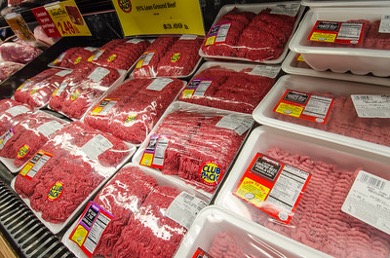Food prices shot up in September, prompting a new volley from the White House over consolidation in the meat industry.
Supermarket prices rose 1.2% last month, helping fuel another increase in the Consumer Price Index. Grocery prices are now up 4.5% over the past 12 months.
Beef prices led the way in September, rising 4.8% (and 17.6% for the last 12 months), but there were significant increases in prices of other foods as well: The cost of fruits and vegetables was up 0.6% last month.
The new CPI report came as the administration announced new steps to address supply chain disruptions. Critical to shippers, the port of Los Angeles will start operating 24/7.
White House press secretary Jen Psaki on Wednesday singled out meatpackers for blame when it comes to rising food prices. The price of meat is “an issue that has been impacting them (consumers) nearly every single day,” Psaki said. She said rising meat prices are due in part “to competition, and the small number of large meat producers who have a dominance over the market.”
Counterpoint: “The administration can keep trying to pin inflation on the structure of the meat and poultry industry, or it can take action on the labor shortage, the ports and supply chain issues and other basic economic factors that do contribute to inflation,” said Sarah Little, a spokeswoman for the North American Meat Institute. She noted that many other items also have risen in price.
By the way: Psaki was asked about a meeting of some Cabinet members, including Ag Secretary Tom Vilsack, on Tuesday night to talk about rising fuel prices. “The president has asked his economic team … to continue to discuss what the options are to address these shortages,” she said.
EPA, Corps seek nominations for WOTUS roundtables
The Environmental Protection Agency and Army Corps of Engineers are asking for nominations of locations and dates for a series of regional roundtables on redefining “waters of the U.S.” in the Clean Water Act.
The agencies are inviting stakeholders to organize regional participants that will comprise up to 15 representatives.
Each nomination must have a proposed slate of participants representing perspectives from “agriculture; conservation groups; developers; drinking water/wastewater management; environmental organizations; environmental justice communities; industry; and other key interests in that region,” the agencies say.
Small towns losing businesses, gaining workers
The Census Bureau reports that the number of businesses located in small towns declined from 2017 to 2019 compared to metropolitan areas.
The report compares metropolitan regions to what are known as “micropolitan” areas, regions anchored by a central county with between 10,000 and 50,000 population. The number of businesses in micro areas slipped 0.3%, while rising 1.5% in cities. The number of workers increased in both.
Census Bureau Economist Andrew Hait says it’s too soon to know what impact the pandemic will have on businesses and employment in rural areas. If employers allow more employees to work from home, there could be a population shift from urban to rural because of the lower cost of living, he said.
FDA adopts voluntary sodium reduction targets
FDA says its new voluntary sodium reduction targets will save billions of dollars in health care costs and prevent tens of thousands of cases of heart disease and stroke.
FDA released its long-awaited targets Wednesday in an attempt to reduce average daily sodium intake by about 12% — from about 3,400 milligrams to 3,000 mg per day — within two and a half years. FDA said it would issue 10-year targets “in a few years” after monitoring industry’s progress toward the new targets.
The latest Dietary Guidelines for Americans recommends consuming less than 2,300 mg of sodium per day, but Americans 14 years and older consume an average of 50% more than the recommended limit.
More to be done: The Center for Science in the Public Interest, a consumer advocacy group that pushed for the guidelines, said they are important because now there are “clear and achievable benchmarks.”
But CSPI said FDA must finalize its 10-year targets and do more to encourage the industry to adopt the voluntary guidelines. Consumers, CSPI said, also need to be educated about the importance of sodium reduction.
EU promises carbon border tax will be gradual
The European Union is assuring World Trade Organization countries that its planned carbon border tax won’t be a shock to traders, according to Geneva officials. The tax on imports, designed to penalize foreign ag and other goods that the EU deems more polluting than domestic products, will be implemented gradually.
Some WTO countries complained that the import tax would not comply with WTO rules. EU representatives responded by stressing the need to support producers and their efforts to reduce carbon emissions.
One key question submitted for the EU in writing by Russia demanded to know if the EU “expects the carbon price to rise and to what extent.”
She said it. “We are not the Postal Service or UPS or FedEx.” - White House press secretary Jen Psaki, when asked by a reporter whether the White House could guarantee that Christmas packages will arrive on time as a result of steps the administration is taking to ease shipping bottlenecks.
Questions? Tips? Comments? Email Philip Brasher at philip@agri-pulse.com





